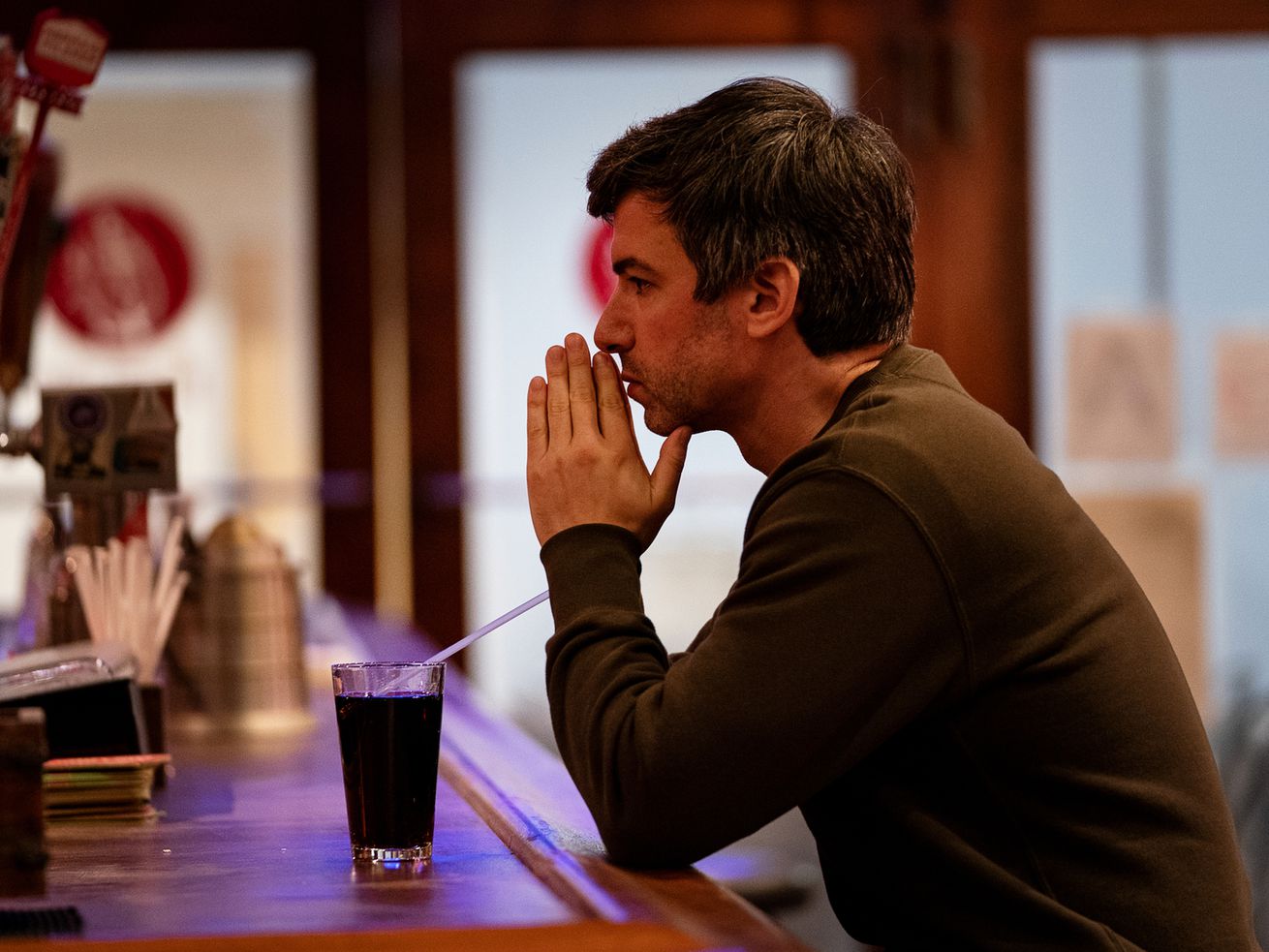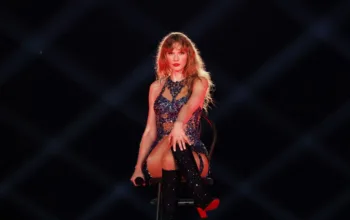Nathan Fielder’s wild HBO show is reality TV at its most bizarre. Or is it a documentary? Or memoir? Or something else?
Imagine a TV show so profoundly strange that the more you thought about it, the less you knew what it … was. The more you dug into the straightforward parts, the less straightforward they got. The further down the rabbit hole you strayed, the more trap doors and dead ends seemed to be scattered along the passageway.
That’s The Rehearsal, from Nathan Fielder, of Nathan For You fame. In his previous show, which ran from 2013 to 2018 on Comedy Central, Nathan “helped” struggling small businesses to “solve” their problems with increasingly byzantine and elaborate and always totally useless schemes. An alcohol store where minors can preorder, for pickup when they reach legal drinking age. A loophole that lets a bar allow customers to smoke inside, provided they are in a theatrical production (to which the resourceful Nathan sells tickets). Throughout, he plays a character that is obviously somewhat related to his “real” self but is, we have to believe, kind of a bit.
Nathan For You could be strange and hilarious; The Rehearsal is in a whole different stratosphere. As the show’s name suggests, it starts out as a kind of social experiment slash therapy innovation: Nathan locates people (on Craigslist, apparently) who need to have difficult conversations or otherwise emotionally fraught scenarios. Then he meticulously recreates the conditions under which they will have this interaction, hires an actor to play other people in the “scene,” and rigorously rehearses the encounter, trying to anticipate possible outcomes and prepare the “real” person for the conversation.
/cdn.vox-cdn.com/uploads/chorus_asset/file/8565937/spoilers_below.png)
Warning: Details from episodes 1-4 of The Rehearsal are discussed below.
In the pilot episode, Nathan helps a man named Kor — a good-natured Brooklyn public school teacher — tell one of his bar trivia teammates that he doesn’t have a master’s degree, though for many years he’s led the team to believe he has. Nathan is ready to help him handle his lie, including building, on a sound stage, a perfect recreation of the bar where Kor’s encounter would occur. (That bar? Brooklyn’s Alligator Lounge, famous among New Yorkers of my vintage for giving out a free pizza with every beer.) It feels like something straight out of Charlie Kaufman’s existentially trippy Synecdoche, New York.
This pilot episode generated immediate buzz, for obvious reasons. It is clear almost from the start that what we’re seeing in The Rehearsal is not as straightforward as the comedy of Nathan For You. Two of the major story beats in The Rehearsal’s pilot episode rely on the fact that Nathan has also rehearsed his encounters with Kor, building a replica of Kor’s house, practicing their first encounter, and later revealing a secret of his own to Kor — all of which happens with the aid of an actor (K. Todd Freeman).
/cdn.vox-cdn.com/uploads/chorus_asset/file/23922776/rehearsal_alligator.jpg)
HBO
The longer you watch The Rehearsal, though, the less obvious it is what you’re actually watching.
And that’s not a bug — it’s a feature. The Rehearsal is at least in part designed to activate a connection that’s rarely alive in the largely passive medium of TV: the link between audience and creator. (TV tends to make us feel connected to characters, not to the people behind the camera.) To put it another way, if it makes you feel weird, that’s the point.
In general, savvy 21st-century watchers that we are, we expect everything on TV — from scripted dramas to the screamiest reality show — to be, in a sense, fiction. Most of us know by now that what we see on TV is crafted reality, not the real thing.
Yet. Yet. The Rehearsal repeatedly defies this. Are people like Kor and Angela (the middle-aged Christian woman with whom Nathan “raises” a “child”) and Robbin (the man she dates, who turns out to be kind of a numerologist) and Patrick (whose brother thinks his girlfriend is a “gold digger”) … “real”? Are they victims? Are they in on it? What about the crew? The actors? Does turning the mechanics of Nathan’s contrived worlds inside out make them more authentic, or are there more layers to uncover?
All of this means that what you see in The Rehearsal — which honestly I cannot believe HBO greenlit, it’s so wild — may not be what your friend sees or someone on Twitter sees. There are a lot of ways of looking at The Rehearsal.
Here are a few.
I
The Rehearsal is an exploitative reality show
And Nathan Fielder is a monster.
Not every one of the “real” people who come on The Rehearsal is made to look bad. Kor in particular seems great. The participants in the Nathan Fielder Acting Method classes that form the backbone of Episode 4 — who, no matter how deep they’re in on the joke, are definitely actors — seem talented, serious, and hard-working. When the teenage version of Angela and Nathan’s “son,” Adam, breaks character and lets himself be an actor named Joshua, he’s startlingly insightful, and his performance is great.
On the other hand, there’s Robbin, who dates Angela and almost moves into the house. He starts out seeming kind of laid-back and cool and ends looking like someone who needs some help. He starts to say things that he later characterized to Vice (after the second episode aired) as “douchey,” but complained didn’t show the full picture of his personality.
Or there’s Patrick, who seems like a pretty ordinary guy, helpful to a man he thinks is his scene partner’s grandpa (he, of course, is also an actor) — except for those glib and shockingly anti-Semitic comments.
/cdn.vox-cdn.com/uploads/chorus_asset/file/23922777/rehearsal_chicken.jpg)
HBO
And of course, there is Angela. Angela! What to say about Angela? On the one hand, she seems exceptionally calm and collected about this whole weird thing, which was admittedly created in part for her benefit but is also just a really odd way to spend a few months of your life. There are moments on the show where you know you’re meant to laugh or at least gawk, when she tells Nathan to “keyword search” Google to find out about Satanic rituals that take place on Halloween, then says that Google is run by Satan. Sometimes she seems like the voice of surprising reason, but often her activities seem harebrained, like your vaguely conspiratorial aunt who posts about essential oil MLMs on Facebook. Nathan even goes so far, at the end of episode 3, to imply that he wishes he could be like her as she “deceives” herself and “gathers only what [she] needs to know and ignores the rest.”
Presumably all of these “real people” knew, on some level, what they were getting into; it’s not like nobody’s heard of TV editing before. But without knowing what their contracts or preparation looked like, or what got left on the cutting room floor, we don’t know how or to what level they are in on the joke or a victim of it — though it seems reasonable to say nobody could have predicted what The Rehearsal would turn out to be. (Maybe not even Nathan Fielder.)
Of course, this happens all the time. It is quite literally impossible to portray the full essence, in all its complexity, of a human being on a TV show. The ethical wickets here are sticky, and always have been. For some people, the question this raises is whether watching The Rehearsal is somehow different from watching The Bachelor or The Real Housewives of Salt Lake City or Love Island. Or, for that matter, if it’s different from watching a documentary that shows people at protests or a true crime series that allows odd characters to appear as talking heads.
If the answer is yes, why? If it’s no, what does that mean about our reactions?
Is that the point?
II
The Rehearsal is an exceptionally weird documentary
And Nathan Fielder is an artist.
The filmmaker Robert Greene is fond of saying, as he recently tweeted, that “pretty much every great documentary is on some level about how it maybe shouldn’t exist.” (He should know; he makes them.)
The difference between documentary (or as I prefer, “nonfiction cinema”) and scripted (or “fiction”) films is that in the first category, you expect that what you’re watching has happened in the real world. In the second, you expect it was staged, on some level, for you to watch, and that you can’t just bump into these actual characters on the street.
That line, though, is far blurrier than awards categories and critics like to make it out to be. When I wrote about this last summer, I noted some of the reasons why:
The context in which we encounter videos and images has also shifted, especially in a streaming age. News, entertainment, and verité footage uploaded to the internet by any random person can and often is all accessed through the same screen or device. If you’ve ever watched a TV show where actors play out a scene that looks similar to what you’re seeing in a YouTube clip, and you’re watching both the show and the YouTube clip on similar screens, it’s even more difficult to resist having the fiction frame how you understand the nonfiction.
The Rehearsal doesn’t just blur the line; it erases it. It tries to make you question not just whether what you’re watching is real, but if anything is real.
/cdn.vox-cdn.com/uploads/chorus_asset/file/23922779/rehearsal_ep1.jpeg)
HBO
Take the just-aired episode 4, for instance, in which Fielder leaves his “family” behind in Oregon and travels to Los Angeles, where he plans to teach the “Fielder method” to a group of actors. The method: shadow a real person and try to understand them from the inside out — their choices, their occupation, their home, their mannerisms — and then essentially become that person in order to “play” them in one of Fielder’s rehearsals. Then, and only then, can they achieve “the level of realism I needed for this project,” as he puts it.
But Nathan gets swallowed by that same dang rabbit hole. He’s not sure how the first day actually landed with the actors, who he finds intimidating. (“They have a way of channeling someone else’s emotions that I don’t fully understand,” he remarks. We’ll come back to that.) So he re-stages the first day, this time while “playing” a randomly chosen member of the acting class named Thomas and populating the room with a new set of actors, who wear the clothes and repeat the same lines as the original class a day before. There’s even a fake Nathan up at the front.
This already feels contrived, because it is. But the more I think about it, the weirder it gets because of the mechanics. Were the students in the first class actually students who thought they were learning something in a class? How did what they said get communicated to the second class, who I guess are all actors, in time for them to learn their “lines”? How did they get the same clothes as the first group? How much time elapsed between the first and second days? Did HBO pay various LA-area establishments to allow acting students to work there, or did they pay the açaí bowl place where Thomas and Nathan work, or did they just pay the açaí bowl place enough to shoot a four-minute scene? Did they really rent all these apartments? Does Thomas actually have a giant Pikachu in his bedroom?
(It’s at least a little funny that Thomas has a Hamlet poster on his wall on which the large text, which we see Nathan reading, is “To be or not to be / That is the question.” Or, wait — did HBO put the poster there?!)
The best documentaries aren’t really about communicating information in a clear fashion (that’s journalism). They’re about making us reevaluate the very act of seeing, the way we encounter and understand the world, the assumptions we make and the ways we mess up. They let us film the world and play it back — which, when I say it that way, sounds a lot like The Rehearsal — and encounter it differently.
And in so doing, encounter ourselves differently.
III
The Rehearsal is a mea culpa memoir
And Nathan Fielder is a wounded man.
It’s not an accident that in what’s supposed to be their most emotionally vulnerable conversation in the show’s pilot, Nathan brings up to Kor that he’s been divorced. (That happened in 2014.) But as Kor starts to share the pain of his own divorce, they’re interrupted by an old man entering the pool. “I didn’t want to go too deep into my private life, so I had pre-planned for an elderly swimming to interrupt us,” Nathan intones in voiceover.
When talking to New York magazine’s Lila Shapiro about the divorce in a 2022 profile, Fielder told Shapiro that this scene accurately depicted his own proclivities. “You’re seeing me control and not wanting to share,” he said, adding that he’s “aware I’m like that, and so it’s in the show.” Later, he catches himself wanting to lie to Shapiro about when he sought therapy following the divorce. He told her that he once lost control of his emotions in a meeting, and it was “a very jarring experience.” He says it was physically painful to talk to a therapist about his emotions.
All of which is right on the surface of the show and a useful lens to look at what’s going on. The first episode is a peek into Nathan’s need for control, and the second one continues that theme, to the point where he decides to just join Angela’s rehearsal — that is, raise her fake kid with her — rather than cast someone in that role.
In the third episode, he finds himself stymied by Patrick’s “strategy” in the rehearsal, by which he means Patrick’s somewhat easy display of emotion when talking about grieving the death of his own grandfather. Later, in voiceover, Nathan says, “I was starting to wonder how I could so easily recreate feelings inside other people’s rehearsals when I couldn’t do it for myself.” By the end of the episode, watching Angela wash vegetables from the “garden,” he’s trying to figure out how to “engineer” emotions.
/cdn.vox-cdn.com/uploads/chorus_asset/file/23922780/rehearsal_porch.jpg)
HBO
In the fourth episode, Nathan finds himself acting as one of his own acting students, surrounded by actors who are playing other acting students. It’s so many degrees removed from reality that I confess my brain kind of broke. He is watching the people around him, wondering in essence what they’re all doing there, even though he brought them there.
On his second go-round playing Thomas on the first day of class (did you get that?), he reflects on the experience:
I felt a rush of excitement come over me when I remembered there were cameras filming me. HBO cameras. I love being on camera, but I wanted to play it cool, like I didn’t care that much … Wait, what is this show? Is it a show about an acting class? Am I supposed to be acting? Something doesn’t make sense. If you’re training actors for a show, why would you be filming the training? I wanted to ask, but I was worried it would seem rude. I didn’t want to stand out. I wanted to impress “Nathan.”
This whole episode causes him to question — or at least “question,” for the show — his own methods, from his actual teaching strategy to seemingly mundane things like asking actors to sign contracts they couldn’t possibly read carefully before they agree. Thomas, the real acting student he tries to more or less become, tells Nathan that he doesn’t like lying to people; Nathan realizes that he’s never really understood Thomas. That … oh dear … we never really know what’s going on inside people’s heads.
So there’s a way of looking at The Rehearsal as Nathan Fielder’s giant and very expensive therapy session for himself, one that implements all kinds of techniques to get around hangups and emotional challenges that he’s always had. That he is still processing the pain that comes with going through a divorce, as well as some of his assumptions about the world and the people he brings into his shows, and he’s doing it on those same HBO cameras because, well, he likes being on camera.
With most people, this would be interminable, impossible to watch. The genius on display here is that all I want to do is keep watching.
IV
The Rehearsal is … well, we don’t know yet
And Nathan Fielder is a trickster.
Actually, this is where I land. HBO gave critics the first five episodes of the show but not the sixth, which suggests some subterfuge. Each episode has a moment (or moments!) where you can feel the rug pulled out from under you, and something you assumed was true suddenly becomes a fabrication. (Next week’s episode has such a moment, and it took my breath away.)
That’s why I think it’s nearly impossible to say what we’re really watching until it’s over. (I sort of expect it will still be impossible when the first season ends, but I guess we’ll see.) I have deep suspicions about how “real” Angela is, for instance. I was raised among people who share most of her beliefs. I was not allowed to celebrate Halloween for the reasons she raises. I’m familiar with her teaching methods (having been homeschooled myself). And when Nathan and “Adam” watch a show together featuring a talking caterpillar discussing lying (another clue?), I knew it was based on a book by mega-bestselling evangelical author Max Lucado. But some of what she says — not just the things that could scan as “crazy” — seem a little too coincidental, to me.
After all, at the start of the third episode, she lectures Nathan (who’s clad in a Batman costume), reminding him that “Not everything is make-believe. Some things are real. You have to open your eyes to reality.”
And maybe this is just the plight of the film critic, but I think most good art can’t be evaluated in pieces; you have to see the shape of the whole to know what you’ve just experienced. It’s like chopping a Picasso in half and then thinking you know what the painting is. You sort of get it, but to really see it, you need to have the whole thing in front of you.
/cdn.vox-cdn.com/uploads/chorus_asset/file/23922783/rehearsal_tv.jpeg)
HBO
That said, one interpretive framework that made me go “huh” comes from PJ Grisar in the Forward, who uses the Kabbalistic concept of tzimtzum to explore Fielder’s methods. It triggered the memory of a Jewish midrash about prior worlds, which I (as a Gentile) encountered first during Darren Aronofsky’s discussions of his films Noah and Mother!; in brief, God created and destroyed many worlds until he finally got this one right. Which is exactly what Nathan does at the end of this episode: he ditches the teenager and rewinds to age 6, thus creating a new world to get right this time. It’s not the first time he’s done it, and it speaks to the vast impossibility, the grasping despair, of being a mere mortal and not an infinite being or energy that can make and un-make at will.
And there are some other, at minimum, clever Biblically inflected coincidences throughout. That Nathan’s “kid” is named Adam — a name he shares with the first man that God created in the Biblical account of Genesis? That the second episode is about not being able to find a suitable “mate” for Angela? That episode 3 prominently features a contentious relationship between two brothers? That the doubting Fielder method “disciple” in Nathan’s acting class is named … Thomas? (In case you were wondering, there are only 11 students in the class.)
On the one hand, I don’t really think Nathan Fielder is invoking ancient scriptures or Midrash Rabbah in making The Rehearsal. On the other hand … maybe? Check back with me when it’s all over.
In any case, speculations about what Fielder is “doing,” in a pedantic way, with The Rehearsal may be less important than what it does to us. If you find yourself wondering what exactly you’re watching, then you’re at least on the right track. “It’s easy to assume that others think the worst of you,” Nathan says at the end of the fourth episode. “But when you assume what others think, maybe all you’re doing is turning them into a character that only exists in your mind.”
“The nice thing,” he concludes, “is sometimes all it takes is a change in perspective to make the world feel brand-new.”
The Rehearsal airs at 11 pm ET on Fridays and streams on HBO Max.
Author: Alissa Wilkinson
Read More



